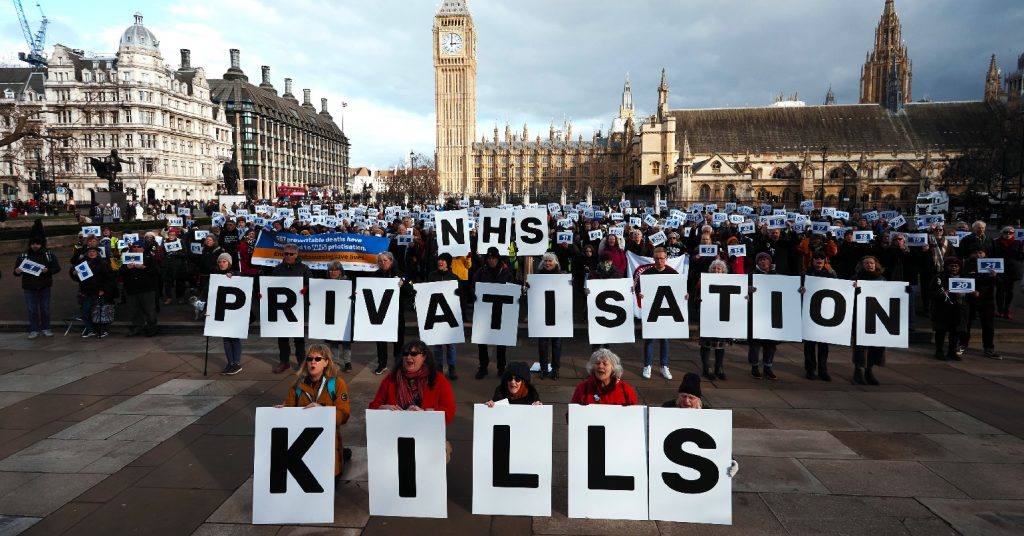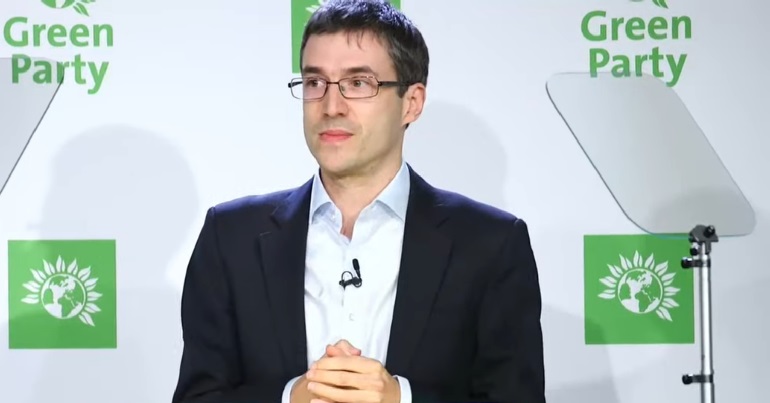What’s happening in Somalia is no natural disaster.
Last month I asked a Kenyan farmer what the impact of food speculation was on her community. “Food is getting more and more expensive” she told me. She talked too about how climate change was already hitting her community, how it was getting harder and harder to grow crops.
It is all too easy to look at images of starving babies and believe this to be some kind of natural disaster. It is easy because the alternative is to accept a painful truth – there are people doing this to those Somalians. They are the bankers gambling on the price of food, oil executives turning a blind eye to the impacts of climate change, corporate lobbyists who insist that the IMF and World Bank prize open the markets of African countries. They are people who say things like “capitalism is the only system which works” when they mean that it is the system which currently works for them. They live in cities like London and New York, and they are often perfectly friendly.
It is easier to look at this as a natural disaster but there is nothing natural about it. Sure there is a drought. And yes, this will have reduced productivity. But some countries are capable of dealing with drought. The fact that this drought has led to this famine is because of that human construction: poverty.
And even the drought itself is nothing natural. Sure, you can’t say that any one weather event is a result of climate change. But you can say that its intensity is. You can say that their frequency is. And, as the Financial Times put it:
“Droughts used to occur in the region typically every 10-15 years but have become more regular, affecting the coping mechanisms of communities hardened to life in a fragile, semi-desert environment.”
So we can say this: without the level of carbon we have pumped into the atmosphere, we would have neither the frequency nor the scale of droughts we see today. Communities would have time to recover and re-build resiliance. Climate change is responsible therefore for a significant portion of the suffering. And so therefore is our resource intensive economic system. And so therefore are those who demand that we maintain that system. In particular, when oil executives work to prevent action on climate change we must understand that they are demanding these deaths.
But the drought is only one factor. It has arrived in the middle of a perfect storm for Somalia, with very high global food prices and very weak government.
The factors driving food prices are numerous: a series of climate changed linked weather events around the world, more and more use of agricultural land being used for biofuels and to produce fodder for animals. But crucial is speculation on these rises. Once bankers who destroyed our economy realised they could no longer rely on sub-prime mortgages – on pricing people out of homes – they moved onto something else: gambling on commodity markets – pricing food off people’s tables. Prices have risen rapidly. It was this cost that the Kenyan farmer I spoke with worried about a month ago. It is this cost that is written across the faces of Somalis fleeing starvation. It is not a natural phenomenon. It is driven by the bankers who caused the credit crunch so they can continue to make their millions. Campaigners and NGOs have made it clear to them that their financial deals risked killing thousands. They refused to stop.

But of course it’s more complex than that. Somalian politics has been a basket case for a long time now. Well, it’s more complex than that too. There isn’t really one Somalian politics. What we are really talking about is more like at least 3 countries. Each has its own government or lack thereof, and each its own successes and failures. More specifically, as I understand it, Somaliland and Puntland are both relatively successfully governed. The Southern half of the country – mostly ruled (or, more accurately, perhaps, not ruled) from Mogadishu is the area with the most serious problems. And so it is no surprise that it is there that the famine has hit.
But if we look at the South – which has effectively been without a Government since 1991, then it’s important to understand why this is. The civil war which ripped the country apart came after 10 years of a disastrous IMF structural re-adjustment program which had seen GDP per capita drop by 1.7% per year since its introduction. This programme consisted largely of cuts (thousands of civil servants were sacked), privatisation, and deregulation – the three horsemen of neo-liberal apocylipse to which we are all becoming accustomed. Of course, the war is more complex than this. But we must accept that economic collapse makes violence more likely: that the Western imposition of corporate capitalist policies had an impact.
When we see dying Somalis, it is all too easy to see a natural disaster. But food prices are so high because bankers – many in this country – are gambling with them. Droughts are more frequent because oil executives demand the right to carry on exploring and extracting and to keep our society addicted to burning. The chaos in the South of the country is the result of a culmination of history – a result among other things of British and Italian and Soviet colonialism and of IMF conditionalities designed for Western corporations not Somali people. These corporate market policies, these climate trashers and these bankers and speculators are hitting people in the UK as we feel the bite of austerity. In the West, people are beginning to understand who it is that is responsible for ruining so many of our lives. We should similarly understand that these same people are not just ruining the lives of those of the Horn of Africa. They are killing them in their tens of thousands.




In other words, they go against the grain of the careers
their parents had. Anna had been looking through my phone while I was naked.
The buccal cavity is a small cavity that has neither jaws nor teeth.
Even just 15 minutes a day keeps your piano playing ability in
tune. Instead, focus on a single thing or just a couple
of things, and try not to move forward until you have reached those goals.
Once you know these scales, in all twelve keys, then you have a very
solid foundation on which to learn how to play piano chords.
i think this is the moment where we as africans we should take a center stage in controling our destiny not to rely on european countries who are exploiting us and our resources and at the end of the day we are poor and they are rich in somalia they have vast oil projects which if somalians cooperately manage they wil wipe away poverty but it is just a wish because the europeans they have colonised us and ivn if we have fought for our independence we are still colonised psycologicaly!!
I hope that the greedy people come to their senses and understand that there is nothing worthy in this life and no one is protected. Money can not protect them from true natural disasters, which I truly pray for hoping that it might make them smarten up and open their eyes before it is too late!
What is happening in Somalia is a dissaster, I have never seen a femine of this nature. I think the world has finally come to an end becuase of greedy. Where are the first world contries for support. What i have just seen is unbelievable. Lets hope that one day Somalia will be back to narmality.
…and what exactly do you make of the religious/guerilla groups who are blowing up aid trucks because the NGO’s refused to pay the entrance fee? What do you say to a woman who has to remain silent for fear of her throat being slashed while her “keeper” goes off to fight this “religious war” by burning her babies food? It’s so much easier to blame Corporate Them than to face the harsh base truth that this death and destruction is cause by nothing more than a male ego trip/pissing match to get to God, Allah, Yahweh with the scalps of the enemy. All that matters is CHILDREN ARE STARVING TO DEATH…stop blaming some maniacal financial system and do something to give women voice and power. Strengthening the female psyche and social support systems is the only way out of this inhuMAN mess.
But you do also hear harrowing accounts of mothers struggling for miles with their SIX children.
Bankers and corporate carbon-pumpers are playing Russian roulette – and not only in the Horn of Africa.
Look at BP’s recently published obscene profits. News Corp (Murdoch) and others could seek redemption by donating the funds needed. But, tragically, Pandora can never be put back in the box.
THIS.
I was in Kenya with a major aid agency in 2007 and farmers told us droughts were getting more and more common, probably due to global warming. As in, they’d been having droughts in this particular region (Ukamba) every four years but within the space of five years it had gone up to every two years. One of the things that appeals to me about anarchism is the ‘no states/no borders’ type of stuff. I don’t understand how we seem to rationalise that those in the West/Global North’s lives are somehow worth more. While I believe strongly in protecting jobs, services etc in the UK, part of me can’t help but think that lefties don’t do enough to combat global capitalism and global poverty.
Made a film that is relevant
This is a brilliant piece of work. Thank you.
“In the West, people are beginning to understand who it is that is responsible for ruining so many of our lives. We should similarly understand that these same people are not just ruining the lives of those of the Horn of Africa. They are killing them in their tens of thousands.”
I hope enough people do realize this…sometimes I fear the truth is hidden from those who sell out for the promise of being rich someday.
“Last month I asked a Kenyan farmer what the impact of food speculation was on her community.”
Brilliant way to start a post.
One of the worst things about this situation is that the money needed for immediate famine relief in Somalia is only a tiny fraction of what was spent on bailing out the Greek economy. While ordinary people are putting their hands in their pockets to help feed the starving, European governments and the IMF would rather protect the bankers.